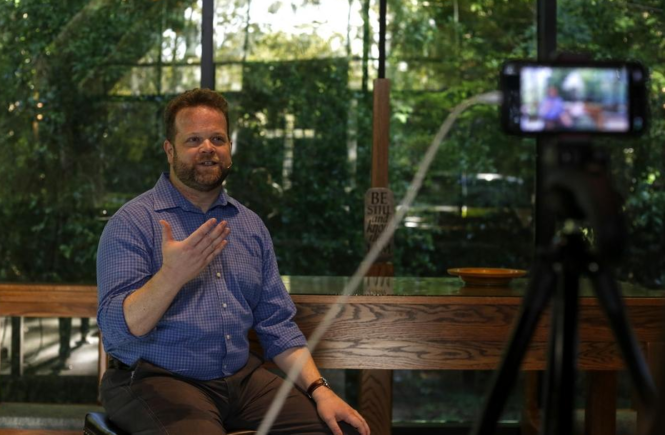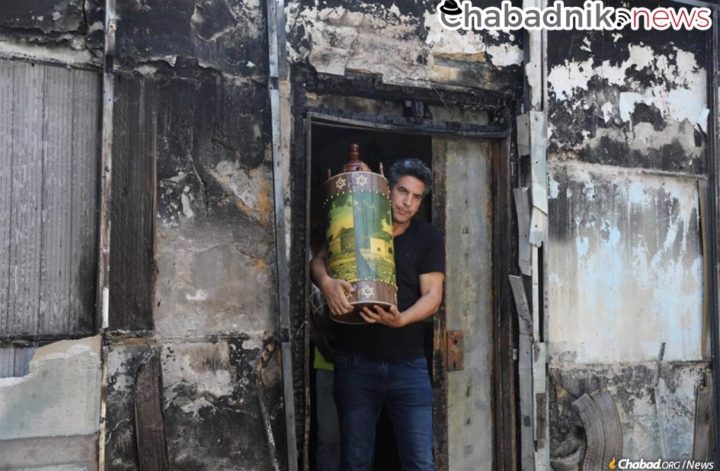Alachua County churches, synagogues and mosques adapt in tumultuous times so followers can keep the faith as holidays approach.
Father Lawrence Peck says he can’t remember a time at St. Patrick’s Church when Mass wasn’t celebrated.
But last week, leaders at Gainesville’s oldest Catholic church locked the doors of the Northeast 16th Avenue house of worship after local government officials ordered no gatherings of 10 or more people in an attempt to control the spread of COVID-19.
Gov. Ron DeSantis issued a state-wide order Wednesday that did not include places of worship but allows stricter local regulations, like the one in Alachua County, according to Mark Sexton, county spokesman.
“It should tell us how extraordinary this is,” Peck said. “We just locked the doors, and it just breaks my heart, but we do need to remain safe. Life is too precious.”
But on St. Patrick’s lawn stands a newly placed symbol of how religious groups across the area are adapting to the uncertain times.
A cross stands on the church’s property for parishioners to kneel and pray outdoors at a time when social distancing prevents them from doing so closely with a priest. For those who wish to receive one of the sacraments, Peck snaps on rubber gloves and chats with the members from a distance in their car.
The church will also leave a basket of palm branches near the front door for parishioners to take for Palm Sunday, celebrated by Christians this weekend.
“It’s not the ideal situation, and it’s not what anyone wanted to do,” he said. “But we’re doing our best.”
Leaders of all faiths in Alachua County say they are grappling, too, with how to continue services when important holidays — Passover, Easter and later in the month, Ramadan — are on the horizon, and as many turn to their faith for comfort in an uncomfortable time.
Friday prayers at the Islamic Community Center have been suspended. The Hindu Devi Temple has closed and canceled all its events.
Officials from the Lubavitch-Chabad Jewish Student & Community Center say they’ve been inundated with calls from the community with questions on how to prepare for Passover, one of the most important Jewish holidays that commemorates the Jews’ freedom from Egypt. The holiday begins April 8 and lasts one week.
To keep with quarantine rules, the center has decided to offer an unusual Passover experience of to-go Seder kits and meals.
The kits include holiday candles, blessing and prayer instructions, a kiddush cup, wine or grape juice, Seder plates, the Haggadah text to read, handmade shmura matzah flatbread, fish, salad and dessert.
A printed instruction guide is included, with an online Zoom Model Seder class for students to tune in and learn how to conduct their own Seder, the meal that marks the beginning of Passover.
Rabbi Berl Goldman said every Jewish household should have the chance to celebrate Seder.
“Passover teaches us to liberate ourselves and look beyond the unimportant things in life and focus on our families and the things in life that truly matter. Surely we are all realizing as the events throughout the world affect each one of us,” Goldman said.
Across town, B’nai Israel has opted to host one large virtual Seder for the congregation’s 350 families. Typically, the ritual feast is held at its synagogue.
B’nai Israel has shifted all its services and classes online.
“It’s challenging because some of the most powerful conversations generally happen person to person,” said Rabbi David Kaiman. “On the other hand, we are in touch very closely via email, telephone as best as we can with congregants.”
At Trinity United Methodist Church, pastors have also altered their plans to host a large meal gathering for their 3,000 members to commemorate Holy Week.
Trinity families are instead asked to prepare their own dinners on Maundy Thursday, April 9, which commemorates the Last Supper. Part of the meal includes communion, which families are asked to partake in at home as well. The change is significant, as communion is one of two sacraments in the Methodist faith.
“Adaptive leadership is one of the challenges of pastorship in this time,” said Steve Price, Trinity’s senior co-pastor. “We’re adjusting, trying to follow all the guidelines.”
The church has begun livestreaming its Sunday worship services — a move he says is important — so people feel as though they are present with other members.
Catherine Price, Steve’s wife and senior co-pastor, said following such adjustments to daily life is the best way to love one’s neighbor, one of the fundamental teachings in the Christian faith.
“We love our neighbor by staying at home, making lots of phone calls, by picking up something extra at the grocery store,” she said. “Really pulling together for us to all care for one another.”




